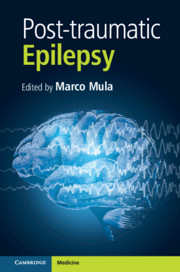Book contents
- Post-traumatic Epilepsy
- Post-traumatic Epilepsy
- Copyright page
- Contents
- Contributors
- Foreword
- Preface
- Chapter 1 Neurobiological Aspects of Post-traumatic Epilepsy: Lessons from Animal Models
- Chapter 2 Post-traumatic Epilepsy: Epidemiology, Definition and Terminology
- Chapter 3 Traumatic Brain Injury: The Acute Management and Prevention Programmes
- Chapter 4 Critical Care Management of Traumatic Brain Injury
- Chapter 5 Post-traumatic Epilepsy in Children
- Chapter 6 Sport-related Concussive Convulsions
- Chapter 7 Accidents and Injuries during Seizures
- Chapter 8 Cognitive Rehabilitation of Traumatic Brain Injury and Post-traumatic Epilepsy
- Chapter 9 Neuropsychiatric Consequences of Moderate to Severe Traumatic Brain Injury
- Chapter 10 Traumatic Brain Injury and Psychogenic Nonepileptic Seizures
- Chapter 11 Post-traumatic Epilepsy and Post-traumatic Stress Disorder
- Chapter 12 Antiepileptogenic Therapies for Post-traumatic Epilepsy: Is There Any Evidence?
- Chapter 13 Effects of Antiepileptic Drugs on Cognition
- Chapter 14 Post-traumatic Epilepsy in Low Income Countries
- Index
- References
Chapter 9 - Neuropsychiatric Consequences of Moderate to Severe Traumatic Brain Injury
Published online by Cambridge University Press: 10 August 2021
- Post-traumatic Epilepsy
- Post-traumatic Epilepsy
- Copyright page
- Contents
- Contributors
- Foreword
- Preface
- Chapter 1 Neurobiological Aspects of Post-traumatic Epilepsy: Lessons from Animal Models
- Chapter 2 Post-traumatic Epilepsy: Epidemiology, Definition and Terminology
- Chapter 3 Traumatic Brain Injury: The Acute Management and Prevention Programmes
- Chapter 4 Critical Care Management of Traumatic Brain Injury
- Chapter 5 Post-traumatic Epilepsy in Children
- Chapter 6 Sport-related Concussive Convulsions
- Chapter 7 Accidents and Injuries during Seizures
- Chapter 8 Cognitive Rehabilitation of Traumatic Brain Injury and Post-traumatic Epilepsy
- Chapter 9 Neuropsychiatric Consequences of Moderate to Severe Traumatic Brain Injury
- Chapter 10 Traumatic Brain Injury and Psychogenic Nonepileptic Seizures
- Chapter 11 Post-traumatic Epilepsy and Post-traumatic Stress Disorder
- Chapter 12 Antiepileptogenic Therapies for Post-traumatic Epilepsy: Is There Any Evidence?
- Chapter 13 Effects of Antiepileptic Drugs on Cognition
- Chapter 14 Post-traumatic Epilepsy in Low Income Countries
- Index
- References
Summary
Moderate to severe traumatic brain injuries commonly present with a wide range of long term emotional and behavioural problems which are often classed as organic neuropsychiatric conditions. These range from mood disorders such as depression, emotional lability, apathy, anxiety disorders such as panic disorder, specific phobia or Post-traumatic stress disorder (PTSD) or long term personality change. These neuropsychiatric co-morbidities influence quality of life and outcomes and cause significant distress to the patient. Hence, accurate and early recognition and appropriate management of these problems is important. Development of post-traumatic epilepsy can further influence neuropsychiatric presentations following moderate to severe brain injury. A range of neuropsychiatric presentations following moderate to severe traumatic brain injury are described and an approach to management is discussed.
Keywords
- Type
- Chapter
- Information
- Post-traumatic Epilepsy , pp. 128 - 139Publisher: Cambridge University PressPrint publication year: 2021

